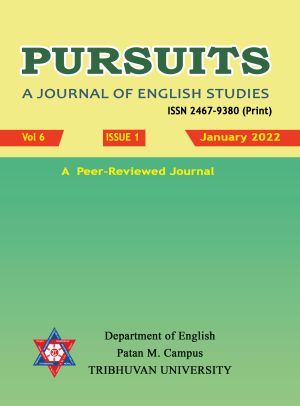Religiosity and Radicalization in Don DeLillo’s Falling Man
DOI:
https://doi.org/10.3126/pursuits.v6i1.46885Keywords:
Portrayal, Religion, Radicalism, Liberalism, Multiculturalism, MarginalizationAbstract
This article analyzes DeLillo’s Falling Man, a 9/11 novel to explore the causes of conflict between the Muslim World and the West. How Islam impacts on their relationship has been the core aspect of discussion in the paper. The paper has found out that there are two paradigms of Islam: fundamentalist and liberal. The former has radicalized Muslim youths in the US universities as exemplified in the case of Hammad, the primary character in the novel. The agents of Islamic fundamentalism including Amir who provokes and prepares youths for suicide bombing have misused Islam for their vested interests. Geopolitics is one of the primary causes of the ongoing conflict between the West and the Muslim World. Radicalization has been found as a very devastating factor among youths as it spoils their future and blinds them to take the physical world meaningless. The author has demonstrated the problems created by the agents of both the West and the Muslim World to implant the seed of hatred against each other. Consequently, the innocent become victims of their heinous intents. Despite advocacy for human values by liberal Americans, Eurocentric mindset prevails as depicted in the novel. Thus, Islamic fundamentalism and Eurocentricism have widened the gap between the West and the Muslim World.




